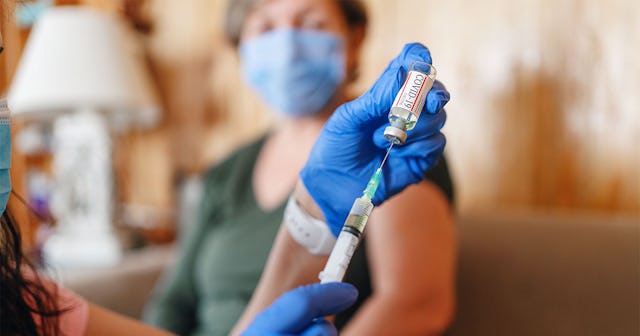Pfizer & Moderna Vaccines Prevent Elderly Hospitalizations By 94%

New data released by the CDC indicates just how effective the vaccines are in preventing hospitalizations among older adults
Promising new data released by the Centers for Disease Control and Prevention (CDC) indicates that both the Pfizer and Moderna vaccines are 94 percent effective at preventing hospitalization in fully vaccinated adults 65 or older — a definite win given that older adults are among those at increased risk for severe illness from the effects of COVID-19.
While the initial clinical trials of both vaccines (as well as the Johnson & Johnson single-dose shot) showed high efficacy in preventing serious illness, the new information undoubtedly provides an added layer of security for high-risk older and elderly adults, who are most at risk of hospitalization or death as a result of the virus.
It seems that fully vaccinated adults over 65 are 94 percent protected, but benefits kick in even before full immunization, with the data showing a 64 percent protection after partial vaccination.
The CDC looked at data from 24 hospitals across 14 states during January through March, finding that hospitalization levels among fully vaccinated older adults was rare, which should help encourage anyone who might be on the fence (or have elderly loved ones that are) about receiving the vaccine to get one as soon as it’s available to them. Of the 417 patients admitted to the hospitals during this time frame, roughly half were over the age of 75.
“These findings are encouraging and welcome news for the two-thirds of people aged 65 and up who are already fully vaccinated,” Dr. Rochelle Walensky, the C.D.C. director, noted in a statement. “Covid-19 vaccines are highly effective and these real-world findings confirm the benefits seen in clinical trials, preventing hospitalizations among those most vulnerable.”
Though it’s still worth noting that both vaccines require time to produce an immune response no matter your age group or underlying health conditions. The study notes that hospitalization rates did not reduce in adults who had received their first dose less than two weeks prior to illness, and someone is not considered fully vaccinated until two weeks after they’ve received their second dose.
“This also highlights the continued risk for severe illness shortly after vaccination, before a protective immune response has been achieved and reinforces the need for vaccinated adults to continue physical distancing and prevention behaviors, such as use of face masks and recommended hand hygiene at least 14 days after the second dose of a 2-dose vaccine,” the scientists wrote.
It’s sound advice for all of us as we slowly begin entering back into the world — protecting yourself and your loved ones reaching that full vaccination status is just as critical as it’s always been, even as we inch towards a new beginning.